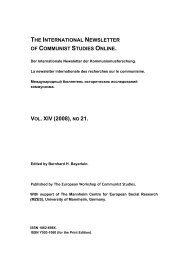11RXNdQ
11RXNdQ
11RXNdQ
Create successful ePaper yourself
Turn your PDF publications into a flip-book with our unique Google optimized e-Paper software.
was the outcome of a new configuration in the French intellectual field: the decline of<br />
social sciences gave rise to structuralism as a new science, which questioned the validity<br />
of existential humanism as the philosophy of the subject. Even though he subscribed to<br />
the ethics and politics of Sartreanism, Roland Barthes was to detach himself from Sartre<br />
after the publication of Mythologies. In the late 1950s and early 1960s, he played a key<br />
role in promoting structuralism. With the effacement of ‘humanism’ as the subject of<br />
critical investigation, this new science studied formal rules, codes and structures. To<br />
quote Bernard Pingaud: ‘We can no longer talk about consciousness or about the subject,<br />
but about rules, about codes, about systems. We do not say anymore that man makes<br />
sense, but that meaning constructs man. We are no longer existentialist, but structuralist’.<br />
36 Althusser attempted to re-think Marxism in scientific, i.e. structuralist, terms by<br />
removing it from the clutches of humanism. Foucault perceived existential humanism as<br />
the medievalism of our age; he dismissed Sartre as a nineteenth-century thinker. Lévi-<br />
Strauss levelled the charge of ethnocentrism against Sartre, because he defined Man in<br />
dialectical terms that restrict history to the West as a historical community; the rest of<br />
humanity is excluded from this historical totality. 37<br />
It is true that Sartre attempted to humanize Marxism’s economism. 38 However, Sartre,<br />
in his preface to Fanon’s The Wretched of the Earth, denounces the collusion of<br />
humanism with European colonialism. He writes: ‘Let us quit this Europe which talks<br />
incessantly about Man while massacring him wherever it meets him, on every corner of<br />
its own streets, in every corner of the world. For centuries … in the name of a supposed<br />
“spiritual adventure”, it has been suffocating almost the whole of humanity’ (this volume,<br />
p. 137). He reveals ‘the strip-tease of our humanism’ by exposing the ideology of the<br />
Enlightenment thus: ‘What empty chatter: liberty, equality, fraternity, love, honour,<br />
country and who knows what else? That did not prevent us from holding forth at the same<br />
time in racist language: filthy nigger, filthy Jew, filthy North Africans. Enlightened,<br />
liberal and sensitive souls – in short neocolonialists – claimed to be shocked by this<br />
inconsistency; that is an error or bad faith. Nothing is more consistent, among us, than<br />
racist humanism, since Europeans have only been able to make themselves human beings<br />
by creating slaves and monsters’ (this volume, p. 151). What Sartre announces in his<br />
preface is the breakdown of the project of the Enlightenment that served Europe’s<br />
colonial adventure and led to the over-exploitation and dehumanization of the colonized<br />
people. Young is right to point out:‘It was the recognition of this use of the human as a<br />
highly politicized category which led to the sustained critique of “Man” by a broad range<br />
of post-war thinkers in the movement known as “anti-humanism”.’ 39 No doubt this<br />
movement overshadowed Sartre’s contribution. To give a response to the question why<br />
he is eclipsed in the postcolonial agenda, one could argue that Sartre was perceived as the<br />
epitome of the very humanism that he condemns in his preface to The Wretched of the<br />
Earth. This movement announced the breakdown of grand narratives of legitimation and<br />
evoked in the 1950s what Derrida calls ‘the eschatological themes of the “end of history”,<br />
of “the end of Marxism”, of “the end of man”, of the “last man” and so forth’. 40<br />
However, by jettisoning the notion of the ‘subject’ to focus on structures of power and<br />
signification, this movement eschewed the colonial problematic which was at the core of<br />
Sartre’s work. The fact that postcolonial studies flourished in Anglo-American circles is<br />
significant in this respect. Postcolonial France repressed its colonial past and the trauma




